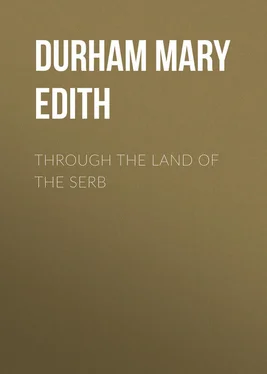Mary Durham - Through the Land of the Serb
Здесь есть возможность читать онлайн «Mary Durham - Through the Land of the Serb» — ознакомительный отрывок электронной книги совершенно бесплатно, а после прочтения отрывка купить полную версию. В некоторых случаях можно слушать аудио, скачать через торрент в формате fb2 и присутствует краткое содержание. Жанр: foreign_antique, foreign_prose, на английском языке. Описание произведения, (предисловие) а так же отзывы посетителей доступны на портале библиотеки ЛибКат.
- Название:Through the Land of the Serb
- Автор:
- Жанр:
- Год:неизвестен
- ISBN:нет данных
- Рейтинг книги:3 / 5. Голосов: 1
-
Избранное:Добавить в избранное
- Отзывы:
-
Ваша оценка:
- 60
- 1
- 2
- 3
- 4
- 5
Through the Land of the Serb: краткое содержание, описание и аннотация
Предлагаем к чтению аннотацию, описание, краткое содержание или предисловие (зависит от того, что написал сам автор книги «Through the Land of the Serb»). Если вы не нашли необходимую информацию о книге — напишите в комментариях, мы постараемся отыскать её.
Through the Land of the Serb — читать онлайн ознакомительный отрывок
Ниже представлен текст книги, разбитый по страницам. Система сохранения места последней прочитанной страницы, позволяет с удобством читать онлайн бесплатно книгу «Through the Land of the Serb», без необходимости каждый раз заново искать на чём Вы остановились. Поставьте закладку, и сможете в любой момент перейти на страницу, на которой закончили чтение.
Интервал:
Закладка:
Everyone began to talk at once, and it was evident from their nods and smiles that we had done the correct thing in coming. Unfortunately we couldn't understand a word, but we bowed to everyone, repeated our thanks, and tried to express our wonder and admiration. Whether we were intended to stay or not I do not know, but, haunted by a desire to escape with as small a collection of vermin as possible, and also to evade the chunks of mutton in the caldron, we backed our way, bowing, into the outer room after a few minutes, and were politely escorted to the entrance. Judging by the smiles and bows of everyone, our visit gave great satisfaction. After we left, the doors were shut, and there was a long lull, during which the mutton was probably consumed. If so, we escaped only just in time. In the afternoon the tambourines and sing-songs started again, and far into the night the long-drawn yowls of the epithalamium came down the wind.
In spite of the mixed Christian and Mohammedan population, excellent order is maintained. The more I see of the Montenegrin, the more I am struck with his power of keeping order. It is a favourite joke against him that when he asks for a job and is questioned as to his capabilities, he replies that he is prepared to "superintend," and it turns out that he is unable to do anything else. But not even our own policeman can perform the said "superintending" more quietly and efficiently. To the traveller the Mohammedan is very friendly. The attempt of a man to draw or photograph a woman is an insult which is not readily forgiven and may lead to serious consequences, but as long as one conforms to local customs these people are as kindly as one could wish, and not by a long way so black as they have often been painted. As a matter of fact a large proportion of the rows that occur all over the world between different nationalities arise from someone's indiscreet attentions to someone else's girl. And this is why a lady travelling alone almost always has a friendly welcome, for on this point at any rate she is above suspicion.
The Orthodox Montenegrin is equally anxious to make one feel at home. At Easter-tide, when the whole town was greeting each other and giving pink eggs, we were not left out. "Krsti uskrshnio je" ("Christ has risen") is the greeting, to which one must reply, "Truly He has risen," accepting the egg. People go from house to house, and eggs stand ready on the table for the visitors, who kiss the master and mistress of the house three times in the name of the Trinity. Montenegrin kisses – I speak merely as an onlooker – are extremely hearty. It is surprising what a number they get through on such a festival. For four days does the Easter holiday last.
Montenegrins take their holidays quietly. It used to be said of the Englishman that he takes his pleasures sadly. But that was before the evolution of the race culminated in 'Any and 'Arriet. The Montenegrin has not yet reached this pitch of civilisation. I wonder whether he inevitably must, and if so, whether what he will gain will at all compensate for what he must lose. For civilisation, as at present understood, purchases luxuries at the price of physical deterioration. High living is by no means always accompanied by high thinking, and … the end of it the future must show. When the Montenegrin has learnt what a number of things he cannot possibly do without, let us hope he will be in some way the better. It is certain he will be in many ways the worse.
Things Christian lie on one side of the Ribnitza, and things Mohammedan on the other. The Turkish graveyard lies out beyond the old town, forlorn and melancholy as they mostly are. The burial-ground of the Orthodox is on the Montenegrin side of the town. The dead are borne to the grave in an open coffin, and the waxen face of the corpse is visible. The coffin-lid is carried next in the procession. I was told that this curious custom originated in the fact that sham funerals were used when the Balkan provinces were under Turkish rule as a means of smuggling arms. But I doubt this tale. For the custom used to prevail in Italy, and does still, I believe, in Spain. It is, in all probability, much older than the Turks, and a tradition that dates from the days when burning and not burial was the usual way of disposing of the dead and the body was carried to the funeral pyre upon a bier. The open coffin, the funeral songs, and the commemorative feasts annually held on the graves by many of the South Slavs, the lights and incense burnt upon the graves, and the lighted candles carried in the funeral processions together reproduce, with extraordinary fidelity, the rites and ceremonies of the Romans. And how much older they may be we know not.
CHAPTER III
OSTROG
I have driven the road many a time since, and I have been again to Ostrog, but I shall never forget that day three years ago when I went there for the first time. It was the only part of that journey about which our advisers said we should find no difficulty; "foreign languages" were spoken, and there would be no trouble about accommodation. We started from Podgoritza early and in high spirits.
The valley of the Zeta is green and well cultivated. It narrows as we ascend it, and an isolated hill crowned with the ruins of a Turkish fortress stands up commandingly in the middle. This is the "bloody" Spuzh of the ballads, the stronghold that guarded the former Turkish frontier. Montenegro at this point was barely fifteen miles across, and Spuzh and Nikshitje gripped it on either hand. From being a border town with an exciting existence Spuzh has subsided into an unimportant village. Danilovgrad, on the other hand, a few miles farther on, a town founded in memory of the late Prince, is full of life, and though a bit rudimentary at present, shows signs of soon becoming large and flourishing. It is possible now to drive right up to the lower monastery of Ostrog by a fine new road, but this did not yet exist on my first visit, and we pulled up at Bogatich – a poverty-stricken collection of huts and a tiny church. A tall, lean, sad-eyed Montenegrin, with his left arm in a sling, came out of the little "han" to greet us, bringing with him a strong whiff of carbolic. They were a melancholy little household. His wife, who brought water for our reeking horses, had had her right arm taken off an inch or two below the elbow, and carried the bucket horribly in the crook of the stump. They cheered up when they heard we wanted a guide to the monastery, and called their daughter from the shed for the purpose.
She came out, a shy, wild-looking thing of about fifteen, barefooted, her knitting in her hands, accepted the job at once, tied our two hand-bags on her back with a bit of cord, and we started up in search of the unknown, armed with a leg of cold mutton, a loaf of black bread, a sketch-book, and a flask of brandy.
It was midday, and almost midsummer; the air was heavy with thunder, and no breath of a breeze stirred as we scrambled up the loose stones. The girl snorted loudly like a pig, to show us the way we should go, and took us, in true Montenegrin fashion, straight up from point to point without heeding the zigzags of the horse-track except where the steepness of the rock compelled her. The way soon became steeper and steeper, in fact a mere rock scramble, and it was abominably hot; and when suddenly our plucky little guide, who had as yet shown no signs of fatigue, gave out all her breath with a long whistle and pointed to the nearest patch of shade, we gladly called a halt. The great advantage of a girl-guide is that she takes you to the right place and you can rest on the way. Little boys as a general rule are vague and inconsequent; they pick up crowds of friends en route , even in the most desolate and apparently uninhabited spots, and you don't generally arrive at your destination. Either they don't know the way, or they conduct you to another spot, for reasons of their own.
Читать дальшеИнтервал:
Закладка:
Похожие книги на «Through the Land of the Serb»
Представляем Вашему вниманию похожие книги на «Through the Land of the Serb» списком для выбора. Мы отобрали схожую по названию и смыслу литературу в надежде предоставить читателям больше вариантов отыскать новые, интересные, ещё непрочитанные произведения.
Обсуждение, отзывы о книге «Through the Land of the Serb» и просто собственные мнения читателей. Оставьте ваши комментарии, напишите, что Вы думаете о произведении, его смысле или главных героях. Укажите что конкретно понравилось, а что нет, и почему Вы так считаете.












